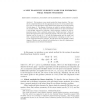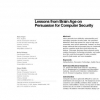24 search results - page 1 / 5 » Secure Computation of the k th-Ranked Element |
EUROCRYPT
2004
Springer
14 years 4 months ago
2004
Springer
Given two or more parties possessing large, confidential datasets, we consider the problem of securely computing the kth -ranked element of the union of the datasets, e.g. the med...
MOC
2010
13 years 5 months ago
2010
Abstract. We introduce a new mixed method for linear elasticity. The novelty is a simplicial element for the approximate stress. For every positive integer k, the row-wise divergen...
CHI
2009
ACM
14 years 11 months ago
2009
ACM
Users generally have difficulty understanding and managing computer security tasks. We examined Nintendo's Brain Age games for ways to help users remember more secure passwor...
PKC
2009
Springer
14 years 11 months ago
2009
Springer
Abstract. We propose an asynchronous protocol for general multiparty computation with perfect security and communication complexity O(n2 |C|k) where n is the number of parties, |C|...
TCC
2009
Springer
14 years 11 months ago
2009
Springer
We study the complexity of securely evaluating arithmetic circuits over finite rings. This question is motivated by natural secure computation tasks. Focusing mainly on the case o...



